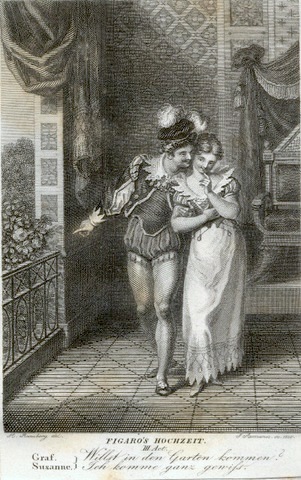Susanna's Stance in Marriage of Figaro
 |
| Count Almaviva and Susanna in Act 3 Early 19th Century engraving |
You might wonder, who is she? Well, as mentioned she is Figaro's fiancee and a maid to the Countess. From what I learned and saw in the play itself is that her class status is low-middle class since she isn't royalty and she's working under the high class and how she dresses is based on her status alone. The function is that she's with the Countess most of the time, and during the act, she would dress up as the Countess and try to expose The Count, from what I noticed. How the character's class status could affect the plot would depend on how the Countess and Suzanna would work together and try to expose the Count on what he did.
Lastly, discussing on Act 5 and the meaning behind the last lines of the play itself. In this act, the Countess disguised as Susanna, who would meet with the Count, Cherubino, and Franchette outside of the courtyard (from what I have seen), and the Count seduces what he thinks is Susanna but Figaro notice them from afar and thinking that she cheated on him. Soon Figora met with Susanna, who dressed as the Countess, who noticed her voice immediately and soon would get back at the "Susanna" (Countess), and the Count seized Figora and placed him under arrest, pretending to have an affair with the Countess. Soon everyone got out from hiding, especially Suzanna when dressed as the Countess and hid from the others, and soon the Countess herself, and the Count was tricked. Then, in the end, both Figaro and Susanna are married. What I think it means is that never trust your instincts to someone you loved, even though there would be games involved in life itself, even though you go out of your way to know what's going on in relationships.
 |
| The Victrola Book of the Opera 1917 |
That's being said, the whole play has to deal with the term "satire." This means it has to do with the use of humor, exaggeration, irony, or ridiculous to expose and criticize people's stupidity and/or vices, mostly coming from the context of contemporary and other tropical issues. How this related story itself is how we could make the play a comedy than a dram itself. For instance, in The Preface to "Marriage of Figaro" by Beaumarchais, it mentions, "But let us take care not to confuse that general criticism, one of the highest aims of the art, with odious lampooning..." (6). This means the play would be confusing at some points of the play itself, even though we have to understand the context of looking at the story and who's involved in the production itself. Overall, this would make sense as being the satire of the story itself.
Work Cited
Beaumarchais. “The Preface to ‘The Marriage of Figaro.’” The Tulane Drama Review, vol. 2, no. 2, The MIT Press, 1958, pp. 3–27, https://doi.org/10.2307/1124743.

Comments
Post a Comment